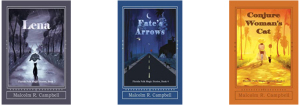Malcolm R. Campbell's Blog, page 81
March 21, 2021
‘Firefly Lane’ by Kristin Hannah
Best I can tell, we really escaped 2020 and are now slogging our way through 2021. If this true, then I’m 12 years behind the times reading Firefly Lane.
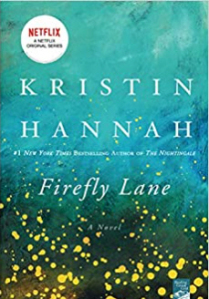 It’s a well-written story about two schoolgirls who, though opposites in many ways, become close friends and make a pact to remain best friends forever. One (Tully) becomes a rich and famous news anchor. The other (Kate), who showed a lot of promise as a writer, ended up having a busy family life as a stay-at-home mom.
It’s a well-written story about two schoolgirls who, though opposites in many ways, become close friends and make a pact to remain best friends forever. One (Tully) becomes a rich and famous news anchor. The other (Kate), who showed a lot of promise as a writer, ended up having a busy family life as a stay-at-home mom.
There’s a lot of realistic push-me/pull-you between Tully and Kate because their lives unfold quite differently, leading to differences of style and opinion, including the question of whether or not Kate is overprotective when it comes to her daughter. Tully and the daughter think so.
If you read Hannah’s afterword, you probably understood why she ended the book as she did. She handled it well. Nonetheless, I didn’t like it. I saw it as adding insult to injury insofar as Kate’s role in the story was concerned. Kate’s life was rather that of the Biblical Job and the ending made her a tragic character rather than a gracefully aging mother contentedly watching her children grow into adults partly in spite of Tully and because of Tully.
Worth reading, but it needed something different and less predictable in the final chapters. I haven’t watched any episodes of the Netflix series.
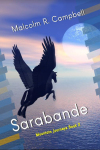 Some readers wanted a bombastic ending to “Sarabande.” I chose a minimalist approach that reflected, in my view, who the character was and how she had changed.
Some readers wanted a bombastic ending to “Sarabande.” I chose a minimalist approach that reflected, in my view, who the character was and how she had changed.
March 20, 2021
‘Midnight in the Garden of Good and Evil’
In the hoodoo tradition, good magic is best performed between 11:30 p.m. and midnight,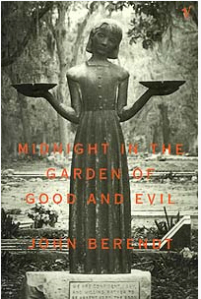 and evil magic is best performed between midnight and 12:30 a.m. Hence we have the rationale behind the title of John Berendt’s 1994 bestseller, Pulitzer Prize finalist, and the inspiration behind the 1997 feature film.
and evil magic is best performed between midnight and 12:30 a.m. Hence we have the rationale behind the title of John Berendt’s 1994 bestseller, Pulitzer Prize finalist, and the inspiration behind the 1997 feature film.
When the book came out, I refused to read it. The odd thing now is that I no longer remember why. Perhaps it was the hype. Perhaps it was the mix of fiction and nonfiction. Or perhaps it was because I was always more of a Charleston person than a Savannah person. The film didn’t do well, a surprise since Eastwood generally does fine work. Had it been a success, I might have seen it. But it wasn’t so I didn’t.
Here’s what seems to have happened. Somebody or something has put a hex on me forcing me to read the book. Okay, that’s enough of an incentive. Makes no sense, though, but who am I to question the origins of hexes or even to ask my Tarot cards about which side of midnight the hex was cast. So, the book is now on order.
If lightning strikes one of the two ancient trees in the front yard on the day the book arrives, I’ll destroy the book.
The same if crows or raven gather in nearby pine trees and raise one hell of a ruckus.
If you read the book and suddenly went over to the dark side, please warn me.
Since this may be a bumpy ride, I’ll need a volunteer to hold my beer.
 Maybe after writing four hoodoo novels, I can safely read the book I have a notebook filled with spells including protection spells.
Maybe after writing four hoodoo novels, I can safely read the book I have a notebook filled with spells including protection spells.
March 19, 2021
Afghanistan – why?
I keep hoping that after all of the promises we hear from candidates claiming they will bring troops home from Iraq and Afghanistan, and close the prison at Guantanamo, somebody will actually do it.
Today’s CNN headline Biden administration considering 6-month extension for US troops in Afghanistan is discouraging. I understand why we’re there: it was a knee-jerk reaction to the 9/11 attacks. Now it’s simply another needless morass like Iraq where U. S. soldiers and civilian contractors continue to be killed and wounded with no discernible or viable policy benefits.
The casualty figures–the new name for the body counts of the Vietnam War era–are said to be low, to be within plan, to be acceptable. These counts do not include the casualties who survive and come home with PTSD and worse and never get their lives back together.
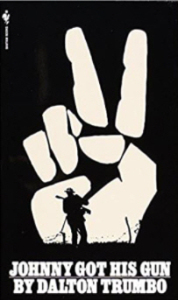 In his 1970 introduction for the new edition of Johnny Got His Gun, author Dalton Trumbo spoke to the “many hundreds or thousands of the dead-while-living,” saying, “So long, losers. God bless. Take Care. We’ll be seeing you.”
In his 1970 introduction for the new edition of Johnny Got His Gun, author Dalton Trumbo spoke to the “many hundreds or thousands of the dead-while-living,” saying, “So long, losers. God bless. Take Care. We’ll be seeing you.”
The book, for me, is one of the most potent and troubling anti-war novels ever written. Trumbo, of course, knows that we typically look away from those who come home in tatters. Very few campaign rallies are held beneath the viaducts and along the city streets where our homeless vets are scratching out a living. We cheer when the men march away and hide inside our comfortable homes when they return–worse than dead.
So, when I ask why we are still in Iraq and Afghanistan even those who keep sending our soldiers there have yet to come up with a sensible answer.
 As a pacifist and conscientious objector, Malcolm R. Campbell is the author of the anti-war novel “At Sea.”
As a pacifist and conscientious objector, Malcolm R. Campbell is the author of the anti-war novel “At Sea.”
March 18, 2021
Glacier Park’s East Side Reopens
NPS Glacier News Release
WEST GLACIER, Mont. [March 17, 2021] – Glacier National Park announces access to the east side of the park will reopen on March 18 at Two Medicine, Cut Bank and St. Mary for foot traffic, skis and snowshoes. Regular winter closures remain in place. Chief Mountain Road will remain closed at the park boundary until road conditions permit.
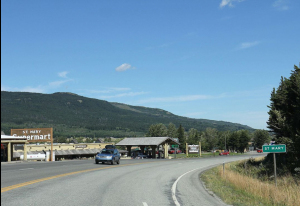 Wikipedia photo
Wikipedia photo
The entrance at St. Mary allows vehicle traffic on Going-to-the-Sun Road for 1.5 miles until the winter gate closure at St. Mary Campground. Access past the gate is allowed by foot, skiing and snowshoeing as is typical of normal winter seasons. The St. Mary Campground remains closed to winter camping until further notice.
The roads into Cut Bank, and Two Medicine remain closed to vehicle traffic for the winter, but access by foot, skiing and snowshoeing is available past the gates as is typical of normal winter seasons. Construction began on Many Glacier Road on March 15 and is closed to vehicular traffic and closed to hiker/biker traffic Monday through Friday through May 28.
Visitors are reminded that winter conditions are unpredictable and can quickly become dangerous. Visitors should prepare for icy conditions, high winds, and snow. Cellular communications in the park are extremely limited.
Access to the park east of the Continental Divide has been closed since March 2020 to protect the Blackfeet Indian Reservation population from COVID-19 due to high-risk members of the community. The decision to allow access to the east side was made after close consultation between health officials from the National Park Service, Indian Health Service, the Blackfeet Tribe, Glacier County and the state of Montana.
–
It will be nice to see Two Medicine, Many Glacier Hotel, and Glacier Park Lodge open again. The news should be especially exciting to organizers and participants at the planned MGH Employees Reunion scheduled for this summer.
March 16, 2021
Can’t win them all
Writers are advised to enter writing contests, even if there are entry fees because it’s not only good practice but it helps one’s online presence when s/he wins, places, shows, or even receives an honorable mention.
 My name wasn’t on any of these lists for a fiction contest’s winners’ announcement yesterday. Invariably, the winners are people who regularly appear on the lists of visiting faculty of numerous MFA programs, have received $1000000000 in grants, have won numerous other competitions, and probably wrote Gutenberg’s first Hardy Boys or Nancy Drew novels.
My name wasn’t on any of these lists for a fiction contest’s winners’ announcement yesterday. Invariably, the winners are people who regularly appear on the lists of visiting faculty of numerous MFA programs, have received $1000000000 in grants, have won numerous other competitions, and probably wrote Gutenberg’s first Hardy Boys or Nancy Drew novels.
On one hand, there’s the thought that if you can’t win them all, it’s better to lose to people with writing credits it’s hard to match. On the other hand, it’s a bit of a wake-up call if–with all the honorable mentions and notables lists–one’s work is considered outside the top 20 entries. I used to fret about this more than I do now.
If you fret too much, you’ll just give up writing, especially when the contest is small and doesn’t have a prize large enough to attract the attention of the BIG TIME WRITERS. It’s easy to worry if you can’t even compete with people who are still in elementary school.
You have to be careful when you enter these competitions because they often have long lists of obscure formatting rules that aren’t natural for most people, as in, must have a 1/8″ margins and 12-point Bodoni type. (Nobody uses Bondoni anymore.) And then, too, it’s easy to get excited about contests which look like sure things as in, For authors who grew up in Tallahassee, Florida and later lived in Waukegan, Illinois where they once saw Jack Benny in concert.
Lose one of those and it’s like sports commentators say when somebody takes a bad fall in a basketball game, Oh, that’s gotta hurt.
Sure, you lose one of those made-for-me competitions, it’s natural to be gunshy about entering anything else for a while. But the temptation is always there. If you don’t enter, you might just shout, “You don’t understand! I coulda had class. I coulda been a contender.”
March 14, 2021
Potpourri for March 14
Potpourri is a mixture of dried, naturally fragrant plant materials, used to provide a gentle natural scent, commonly in residential settings. It is often placed in a decorative bowl. – Wikipedia
Actually, potpourri makes me sneeze, so I never saw the attraction. However, as always, my potpourri posts are unscented. So, if you sneeze while reading this, it means you haven’t dusted your house for a while.
My publisher tells me that production of the Fate’s Arrows audiobook is on schedule and sounds great. As I slowly work my way through Weeping Wall, my novel in progress, it’s nice to see something new en route to Amazon.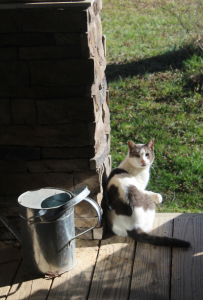 The male, short hair, black-and-white kitty who has adopted us after being dropped off on our country road by some nefarious person is slowly working his way into our hearts. Were refuse to name him until we have a chance to take him to the vet to be checked out. Right now, he is simply OC, for outside kitty. Our inside kitties are curious but aren’t above hissing at him when we open the front door.Other than sore shoulders, no apparent side effects from our first Moderna COVID shot. Nice to have that out of the way. Maybe we’ll be able to visit the granddaughters in Maryland this year since COVID cancelled last year’s planned trip.
The male, short hair, black-and-white kitty who has adopted us after being dropped off on our country road by some nefarious person is slowly working his way into our hearts. Were refuse to name him until we have a chance to take him to the vet to be checked out. Right now, he is simply OC, for outside kitty. Our inside kitties are curious but aren’t above hissing at him when we open the front door.Other than sore shoulders, no apparent side effects from our first Moderna COVID shot. Nice to have that out of the way. Maybe we’ll be able to visit the granddaughters in Maryland this year since COVID cancelled last year’s planned trip. I’m finally getting around to reading Kristin Hannah’s Firefly Lane. My nightstand is always overflowing and my wish list on Amazon is infinite. It’s a nice change of pace from John Hart’s The Unwilling. Being an old-fashioned sort of person, I’ve always preferred the term “firefly” to “lightning bug.” My GP has kept my prescriptions in place even though I haven’t seen him for a while. I said I thought doctors’ offices were dangerous for people my age until I had my COVID vaccinations. Fortunately, he agreed.On a bit of a political note, I’m really getting tired of turning on the news and seeing that there’s more unrest in Portland and elsewhere. We have much to do to fix everything that’s broken, but it will take time. The violence from those riding the protestors’ coattails isn’t helping.It’s time to change my Facebook cover photo. So, in hopes of seeing some springtime weather soon, here’s the new picture compliments of NPS Glacier National Park:
I’m finally getting around to reading Kristin Hannah’s Firefly Lane. My nightstand is always overflowing and my wish list on Amazon is infinite. It’s a nice change of pace from John Hart’s The Unwilling. Being an old-fashioned sort of person, I’ve always preferred the term “firefly” to “lightning bug.” My GP has kept my prescriptions in place even though I haven’t seen him for a while. I said I thought doctors’ offices were dangerous for people my age until I had my COVID vaccinations. Fortunately, he agreed.On a bit of a political note, I’m really getting tired of turning on the news and seeing that there’s more unrest in Portland and elsewhere. We have much to do to fix everything that’s broken, but it will take time. The violence from those riding the protestors’ coattails isn’t helping.It’s time to change my Facebook cover photo. So, in hopes of seeing some springtime weather soon, here’s the new picture compliments of NPS Glacier National Park:

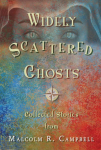 Malcolm R. Campbell is the author of paranormal, magical realism, and contemporary fantasy short stories and novels.
Malcolm R. Campbell is the author of paranormal, magical realism, and contemporary fantasy short stories and novels.
March 13, 2021
To kill a culture, destroy its language
Anyone who has read U.S. history, especially the relationship between both the church and the government and the indigenous tribes, knows that the powers that be did everything they could to destroy native American languages. It was thought, with much arrogance, that Indian Nations needed to become more white. That included speaking English, becoming Christians, and giving up everything else that contributed to the identity of the people in the territory that eventually became the United States.
I am happy to see that work continues to restore Blackfoot, Hawai’ian, and other indigenous languages before the last native speakers die. While the youth in such cultures may not yet understand this, the dying languages define who they are, their cultures, and their world view.
This is a sensitive subject for me since my Scots ancestors faced the suppression of Gàidhlig which now faces an uncertain future in spite of attempts to maintain it. In general, the subject of reparations bothers me because it breaks an age-old axiom that sons and daughters cannot be held responsible for the crimes of the fathers and mothers, and grandparents.
 Yet, I think we can find ways to become more aware of endangered languages and, potentially, donate time, money, and other resources to schools and other organizations trying to save native languages from oblivion. I am partial to the Piegan Institute in Browning Montana that is working to restore the Blackfoot language. For an English speaker, I find Backfoot very difficult in part because it’s built on a world view so different from mine.
Yet, I think we can find ways to become more aware of endangered languages and, potentially, donate time, money, and other resources to schools and other organizations trying to save native languages from oblivion. I am partial to the Piegan Institute in Browning Montana that is working to restore the Blackfoot language. For an English speaker, I find Backfoot very difficult in part because it’s built on a world view so different from mine.
One of the founders of the Institute asked me why I cared. I said that my ancestors’ language (Gàidhlig) was banned for the same reasons Blackfoot was banned. Banning a language steals a culture’s soul and keeps it under our thumb
March 12, 2021
When you were in high school, did you have a career plan?
Lots of people do. They take the courses they need to take to prepare for the college degree(s) they want. A fair number plan to do what one or both of their parents did–law school, med school, sales, science, the military. And, I’m not counting the jobs people want when they’re kids; in my era, it was often a doctor, a policeman officer, or a firefighter.
From time to time, people on Facebook ask questions like, “How close is your career to the one you wanted as a high school student.” My answer is a rare one because I say, “It’s the same.” What about you? Did you always know what you wanted to do? If so, did you end up doing it?
 I ran one of these at a rail museum though my wife was better at it than I was.
I ran one of these at a rail museum though my wife was better at it than I was.
There have been times when I wanted to be a clinical psychologist (college degrees Radio/TV and Journalism didn’t prepare me for that) National Park Ranger (NPS was looking for people with biology or law enforcement backgrounds when I inquired), passenger railroad engineer (AMTRAK killed that dream even though I have run a locomotive).
At the times when I was looking, magazines were always in the middle of cutting back on their staff and newspapers were paying poverty wages for beginning reporters even though I had a lot of newspaper credits from news releases written while in the Navy.
Oddly enough, I earned most of my income over the years from technical writing and corporate communications articles. Like my wife, I learned how to write code as well as the manuals that accompanied the applications that grew out of that code. Several computer companies on my resume wondered why, as a technical writer, I caught more programming bugs than those hired to test the programs. My answer was simple: as a writer, I loved the “what if?” game. When going through a new program, I always thought, “What will happen if I do this?” Of course, “this” was something neither the programmers nor testers anticipated, so they didn’t find the weak areas in the code. Hahaha–a good old liberal arts education was actually good for something.
However, by the time those Facebook career questions came along, the corporate jobs were long gone, and–finally–I was doing full time what I wanted to end up doing when I was in school. Most of us who write, follow a twisted route of blind alleys and dead-end streets to get there.
Did you follow that kind of route, first one thing and then another, and then suddenly a side street you never knew about turned into an avocation and then a career? A lot of us have been there and done that and wondered just where our careers were going, if anywhere.
March 11, 2021
‘The Unwilling’ by John Hart
This is probably the most powerful crime novel I’ve read in years, but I’ll tell you now, it’s not for the squeamish. Many of the characters in this novel have no souls or are flawed in some fundamental way the is broken beyond mending. Gibson French, the son of a police detective and an overprotective mother lost his older brothers to the Vietnam war, one to death, the other–Jason–to horrors that changed him into an unknowable man.
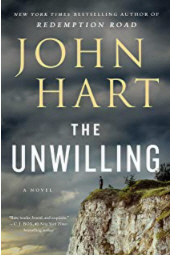 Jason comes home after serving time in prison and wants to get to know Gibson (Gibby). They drink beer, they meet women, they talk. Innocent, enough, right, until a young woman dies in a horrific fashion and Jason is the presumed killer. Detective French doesn’t want Gibby to be influenced by Jason, much less drawn into probable crimes and the wrong crowd.
Jason comes home after serving time in prison and wants to get to know Gibson (Gibby). They drink beer, they meet women, they talk. Innocent, enough, right, until a young woman dies in a horrific fashion and Jason is the presumed killer. Detective French doesn’t want Gibby to be influenced by Jason, much less drawn into probable crimes and the wrong crowd.
All of Hart’s novels are memorable. No doubt, the family dynamics made The Unwilling difficult to write. This novel is, perhaps, his best, though I think it was more gritty than it needed to be. But, given the characters, perhaps not. I am happy with the ending, though the characters and the novel’s readers go through hell to get there.
Around the edges of the plot, we have Vietnam’s My Lai massacre and the prospect that it wasn’t the only war crime that happened during the war. Jason knows but hasn’t been willing to speak of it.
Gibby comes of age–in spades, one might say–and, the wonder of this novel is that he survives the process. In fact, perhaps his parents also survive the process. These are strong characters, a twisted plot, and issues that will stick with the reader long after the last page of the novel is reached. That’s what makes good fiction.
March 10, 2021
The first shot
The online application for finding the nearest COVID vaccination station kept directing us to places that were at least 100 miles away. Yesterday, my wife got fed up when we were told to drive to someplace halfway between Atlanta and Birmingham, AL. Not convenient.
So, she called the county health department and they said, “Can you and your husband come in tomorrow morning at 10:45?” “Sure.”
 We expected an overflowing parking lot and a long line inside the building. The parking lot looked suspiciously normal. Inside, there was a short line. Had to present our driver’s licenses and fill out an information sheet. We got our Moderna vaccinations within about ten minutes and then spent another fifteen minutes waiting to make sure we had no side effects. We didn’t.
We expected an overflowing parking lot and a long line inside the building. The parking lot looked suspiciously normal. Inside, there was a short line. Had to present our driver’s licenses and fill out an information sheet. We got our Moderna vaccinations within about ten minutes and then spent another fifteen minutes waiting to make sure we had no side effects. We didn’t.
They will call us when it’s time for the second shot. I’m impressed: the whole operation was friendly and efficient. We left with a comprehensive information sheet about COVID and about the vaccine. Kudos to Floyd County, Georgia. Now we can really feel there’s light at the end of the pandemic tunnel.

